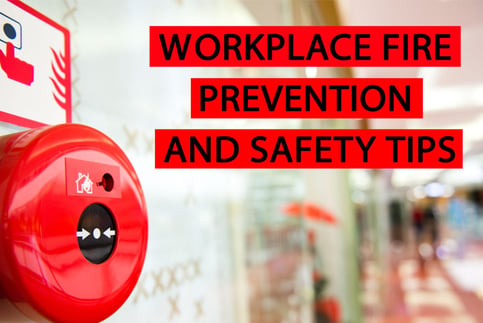Fire Safety


Importance of fire safety:
Fire prevention is crucial for protecting lives, property, and minimizing financial losses. By implementing fire prevention measures, businesses and individuals can significantly reduce the risk of fire outbreaks and their potential consequences. Fire safety training and awareness programs are also vital for equipping people with the knowledge and skills to prevent fires and respond effectively in an emergency.
According to the US National Safety Council (NSC), the leading causes of home fires and injuries are cooking and heating. Thus, fire safety at home should be prioritized by practicing safety tips and protocols when using electrical appliances, cooking equipment, and others that may be fire hazards.
In addition, 2021 data from the US Fire Administration states that 116500 non-residential building fires led to 1025 injuries and 115 deaths. This is just one reason to implement fire safety in the workplace and mitigate the negative business impacts of fire related incidents.
Moreover, fire safety is of paramount importance for the following reasons:
· Preserving life – Implementing measures helps protect individuals from harm and ensures their well-being.
· Protecting property – By following fire safety protocols, there’s minimal risk of property loss and destruction, potentially saving valuable assets and investments.
· Preventing financial losses – Adequate measures reduce the risk of fire related damages, avoiding financial burdens associated with property damage, repairs, and insurance claims.
· Safeguarding the environment – Since fires cab release toxic gases and pollutants and destroy natural habitats, fire safety practices can prevent such incidents and minimize harm to the environment.
· Ensuring business continuity – By safeguarding the workplace against fires, businesses can protect their employees, maintain productivity, and avoid costly downtime.
· Complying with regulations – Many jurisdictions have specific codes and regulations that must be followed. Adhering to these ensures legal compliance and helps avoid penalties or legal consequences.
· Promoting public safety – By prioritizing fire safety, communities can create a safer environment for everyone, reducing the overall risk of fire-related accidents and emergencies.
Organizations with proper fire safety precautions operate more effectively and financially, as reducing warehouse material losses and employee absences contributes to the creation of a safe and successful environment.
Fire Safety Tips:
1. Install fire protection:-
Smoke alarms are your best early warning system in the event of fire. Install smoke alarms on every level of your home, including the basement, and outside each sleeping area. If you sleep with the door closed, install one inside your sleeping area as well.
Test alarms every month and replace batteries once a year, or whenever an alarm ”chips” to signal low battery for another use – a disabled alarms can’t save your life. Replace all alarms that are more than 10 years old. For complete home protection, consider installing an automatic fire sprinkler system.


2. Plan your escape from fire:-
If a fire occurs in your home, you have to get out fast. Sit down with your family and work out an escape plan in advance. Be sure that everyone knows at least two unobstructed exits – including windows – from every room. (If you live in an apartment building, use the stairs, not the elevator to escape from fire). Decide on a meeting place outside. Have your entire household practice you escape plan at least twice a year.
3. Keep an eye on smokers:-
Careless smoking is the leading cause of fire deaths in North America. Smoking in bed or when you are drowsy could be fatal. Provide smokers with large, deep, non-tip ashtrays, and soak butts with water before discarding them. Before going to sleep or leaving home after someone has been smoking, check under cushions and around upholstered furniture for smoldering cigarettes.
4. Remember :matches and lighters are tools, for adults only!
Use only child-resistant lighters and store all matches and lighters up high, where kids can’t see or reach them, preferably in locked cabinet. Teach children that matches and lighters are tools, for grown-ups only. Teach young children to tell a grown-up if they find matches or lighters; older children should bring matches and lighters to an adult immediately.
Eatablish routine fire prevention and emergency procedures
Seamless evacuation of the building takes place. Install fire alarm systems at significant points. Get all the essential documents and files backed up in a safe place away from the main office.
Fire can happen anywhere and anytime. The best way to avoid losses due to fire accidents is by preventing it. Here are some measures that would ensure fire safety in the workplace:
1. Compliance with the law:- The premises must be compliant with NBC guidelines that many states follow.
2. Fire Safety Audit:- Companies should ensure periodical fire safety audit of all the fire safety equipment and system. There are numerous things that have to be checked during fire safety audit. It should be ensured that
a) The fire alarms are always working
b) The emergency exits are always open and easy to open
c) Emergency lighting is in place
d) Fire exits are visible and at the right place. If there is any fault in he system, it should be recorded. To ensure fire safety, such audits should be carried out at regular intervals.
3. Drills and Training:- Conducting mock drills with employees helps them to be aware of and importantly alert. It should make them respond to the situations quickly.
4. Evacuation Plan:- All buildings must have an evacuation plan. Employers should ensure that,
a) All escape routes are clear without any clutter.
b) All fire exits are clearly marked.
c) There are enough exits to safely evacuate all people inside the premises.
d) A safe meeting point for all the staff.
e) Fire exits are differently abled friendly.
When you are a business owner, with any kind of industrial operations, industrial fire prevention and protection must be prioritized. Due to the large -scale nature of your business, the heavy dependency on different equipment, and the usage of hazards materials, the general risk of industrial fires and related emergencies are unfortunately very high!
Equipping yourself completely with industrial fire and safety information is not only the best way to ensure that every single person working for you is as safe as possible but also saves huge sums of money that industries and governments lose due to industrial fires, every year.
And the best way to prevent a fire emergency is to understand what causes in the first place
1. Combustible Dust
Combustible dust is minute particulars that cause a huge explosion hazards when they hang in the air especially under specific conditions.
2. Flammable liquids and gasses
Some examples of flammable gasses are acetylene, liquefied petroleum gas. Hydrogen methane, propane, and some flammable liquids are methylated spirits, petrol, kerosene, and acetone.
3. Hot work
Hot work is any activity or process that causes a source of ignition, this could be through a flame, heat, or even a spark. Fire emergencies caused as a result of hot work are extremely common and also extremely dangerous and hence need to be controlled in order to prevent industrial fires.
4. Electrical hazards
Electricity is a powerful force so it no surprise that it is one of the most common causes of fire in workplaces. The specific hazards that cause an electric fire are wiring that is exposed, overloaded outlets, extension cords, overloads circuits and static discharge. The reason electric hazards can turn out to be the most dangerous of all the above causes of industrial emergencies is that a mere spark by one of the above along with any either combustible dust, flammable liquids, and gasses, or even hot work, can result in a catastrophic fie emergency.


As previously mentioned, industrial fire emergencies not only cause massive destruction of property and financial losses but, the biggest impact of them is on the people. All the employees in the workplace where the above fire hazards are present are all at great risk in case of an industrial fire emergency. But it is only the employees who have to face losses in case of a fire. An employer is also at significant risk by putting the employees in danger. In the unfortunate circumstance that an employee gets hurt in an industrial fire emergency, the employer is to undergo various costs such as cost of compensation, medical aid, lost time, cost of training a new worker, cost of investigation, supervision, and inspections, cost of wages payable during injury and cost of loss to the worker and his family.
Fire safety in industry offers numerous benefits, including protecting employee lives and property, reducing insurance costs, enhancing business reputation, and minimizing disruptions. Effective fire safety measures also contribute to long-term cost saving through prevention and mitigation of fire-related incidents.
Here are some specific benefits of having a fire prevention plan in place:
1. Reduced risk of fire
By taking steps to prevent fires from occurring, a fire prevention plan can help to reduce the risk of fires in the workplace. This can help to protect employees, customers, and other stakeholders, as well as the business itself.
2. Enhanced safety
A fire prevention plan can help to ensure that employee are aware of the risks of fire and the steps they should take to prevent fires from occurring. This can help to crate a safer work environment for all employees.
3. Protects property and assets
A fire can cause significant damage to a business’s property and assets, including equipment, inventory, and documents. By having a fire prevention plan in place, a business can take steps to protect its property and assets from damage in the event of a fire.
4. Minimizes disruption to business operations
If a fire does occur, it can disrupt business operations and cause significant losses. A fire prevention plan can help to minimize the disruption to business operations and help the business to recover more quickly in the event of a fire.
5. Protects reputation
A fire can also damage a business’s adequately prepared to prevent fires or respond to them. Having a fire prevention plan in place can help to protect a business’s reputation by demonstrating that the business is taking steps to ensure the safety of its employees and stakeholders.
6. Increases employee confidence and safety awareness
Fire safety training fosters a cultures of safety and responsibility among employees. When workers are confident in their ability to handle an emergency, they are more likely to feel secure in their workplace. This reduces anxiety and increases overall employee satisfaction, which can enhance productivity and morale. Employees who feel safe are more engaged and more engaged and motivated to perform well.
And a trained employee in an office building will feel confident in knowing their emergency exits, fire extinguishers ‘locations, and evacuation procedures promoting a sense of security.
Our Address
5A/3, Ratan Nagar, Teen Dukan, Dehar Ka Balaji, Jaipur, 302039, Rajasthan
greendashindia@gmail.com
+91-8003097697
About Us
Greendash provides consultancy in environment, health, safety, and fire protection, ensuring compliance and sustainability across various industries in India.
